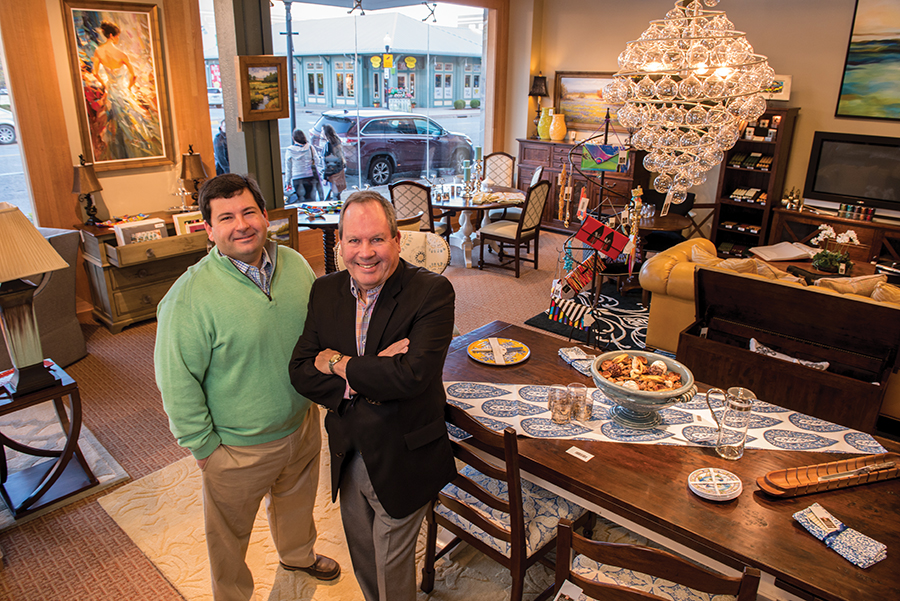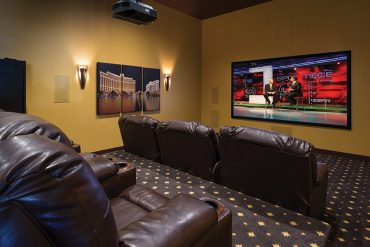MacKenzie-Dow Fine Furniture partners with Marshall University to bring exquisitely crafted products to the Huntington area.
By Jean Hardiman
HQ 92 | WINTER 2016
For more than 12 years, Gary Adams had a hard time explaining to people here in Huntington what he did.
He could say that he and his son, Bonner Adams, co-owned MacKenzie-Dow Fine Furniture, which has a small plant off Hal Greer Boulevard. He could explain their craftsmen take Appalachian Black Cherry lumber and handcraft pieces inspired from 17th- and 18th-century Europe. He could even tell them they have a 13-step finishing process to give it a polish like no other.
But because the furniture company didn’t have a showroom in Huntington, and its nearest retailer was in St. Albans, they couldn’t get the true picture because they couldn’t touch it.
“It’s very tactile,” Gary Adams, president of the company, says. “That’s why it needs to be on floors. You can’t see it in a photo. You have to put your hands on it.”
Now, they can. Working in collaboration with Donald Van Horn, dean of Marshall University’s College of Arts and Media, MacKenzie-Dow opened its first showroom in Huntington last year. It’s located on the ground floor of the new Marshall University Visual Arts Center, occupying the historic Anderson-Newcomb building across from Pullman Square.

The showroom is also a design studio, staffed by two interior designers, Marshall graduate Holly Linn-McComas and Jennifer Grubbs, a graduate of Mountwest Community & Technical College. They work with clients on everything from furniture pieces to lighting to wall coverings for their homes or businesses.
With high-end products that have grown in popularity throughout the country, Gary Adams wasn’t sure what exactly would happen when he opened a showroom in his hometown. He’s been pleasantly surprised.
“It’s really going better than we anticipated,” says Gary Adams. “The range of customers coming to visit us is from Charleston to Louisville to Columbus, and so our appeal has really grown. We now have people actually beginning to collect our pieces. Some of it comes from people who have visited our store at The Greenbrier, but a lot of it comes from social media as well.”
In West Virginia, MacKenzie-Dow now sells fine furniture, most special ordered, from its Huntington showroom as well as from Colonial Interiors in St. Albans and from its store located in The Greenbrier’s Art Colony, which opened about five years ago.
“We’ve done a lot of the homes in The Greenbrier Sporting Club, the private development that is around The Greenbrier Resort,” Gary Adams says. “We did the executive offices of the owner, Jim Justice. A number of years ago, we did a lot of work for Summit Lodge.”

MacKenzie-Dow furniture is also found in furniture stores, interior design studios, and to-the-trade-only showrooms across the country, as well as online. It has sold pieces to all 50 states in the union.
“We just received an order from Rio Hotel and Casino in Las Vegas for the Guy Fieri Cantina,” Gary Adams says. The company also has furniture in the Taconic Hotel in Vermont and The Lodge at Glendorn, a luxury hotel in Pennsylvania.
Back in 2001, when the venture got underway, Gary Adams says he never dreamed it would become so widespread. Gary Adams has a background in corporate law, but in 2001 had changed gears and was making cabinetry.
“We were making kitchen cabinet drawers, door fronts and components for small cabinet makers in the Midwest, and cabinet re-facers,” Gary Adams says.
In 2001, former furniture salesman Don Ozmar had an idea to develop a product that had an English look and feel but was made in West Virginia. He approached Gary Adams, and his company made some product for him for the October 2001 High Point Market. Afterward, they decided to pitch in together and form a company called MacKenzie-Dow, the name based on the middle names of Ozmar’s two children.
“It rolled off the tongue well and it was catchy. People liked it,” Gary Adams says, adding that Ozmar is now mostly retired and living overseas.
“I think what really did it for me was seeing High Point and seeing that it’s a great relationship business,” Gary Adams says. “I’ve gotten to know people literally all over the world and have friends that I do business with from coast to coast and north to south and in Canada. It’s about making a product that people appreciate having in their homes and that’s going to last a lot longer than I will on this earth. It has a sense of permanence.”
Today, the company has about 30 employees and, after a slow period during the recession, is picking up. They outsource some of their assembly and some fabric work for chairs with cushions. They also contract with an award-winning designer, Shannon Lookabill out of Grand Rapids, Michigan. He’s been designing pieces for MacKenzie-Dow for the past four years, Gary Adams says.
Their biggest customers have turned out to be younger than they expected, he says. Many of them are in their 30s, looking for quality furniture that will last.
Today’s customers are also more concerned about the origin of their products, Bonner Adams says.
“Just like we’ve seen in other industries like food, clothing to some degree and things like craft beer, people are searching for things that are produced domestically and authentic,” he says. “Where it’s made, who made it, what materials are used – these all are things that people are asking about when they buy products. That lends itself to what we do, making something that’s unique and special.”
Companies that provide their lumber to MacKenzie-Dow all provide statements about how the wood is responsibly harvested.
“Our carbon footprint is almost nothing,” Gary Adams says.
Each piece is bench crafted, made by a single craftsman after the parts are cut. They use mixed grades of cherry lumber and build blemishes, such as knots and splits, into the piece, which both gives it character and preserves more of the lumber.
“We use the board as it is,” Bonner Adams says. “It’s a hand-hewn product. People understand that a lot of love and labor and time is put into what we do. People understand it’s not a mass-produced piece of furniture.”
That appeals to them, he says. The pieces range in price from about $750 to the neighborhood of $4,000, and customers who are happy to pay for quality are now coming right into their door in Huntington, Gary Adams says. Some just happen upon the showroom, and some drive from nearby cities because they’ve seen MacKenzie-Dow pieces in the homes of their friends or online.
“We’re getting a lot of foot traffic. It’s a fantastic spot,” Gary Adams says. “Initially, people asked why we didn’t sell in Huntington. Back eight or 10 years ago, we didn’t have the breadth of the line that we needed. We had to refine our methods and our styling, which we’ve done.”
He says Van Horn, who has crafted furniture himself for his own home, first caught up with Bonner about the idea of the showroom.

“We thought this was a nice fit,” Gary Adams says. “We thought it was such a premium spot in the way that downtown Huntington has developed around Pullman Square that we just couldn’t say no to it.
“We took on the project and worked with Marshall on allocating a space for us,” he continues. “We designed it internally and brought in other manufacturers – upholstery manufacturers, lighting, paint, artwork, accessories, candles and things of that type. It just came together beautifully.”
More is planned, he says.
“We’re looking forward to working with Marshall students in internships and possibly even being a venue through which art students can merchandise their creations,” Gary Adams says. “One of the tie-ins we see is that this gives students a way to see how they might go into business in a commercial setting and use the skills they’ve developed.”
It’s a wonderful partnership, he says.
“We’re really pleased with our association with Marshall.”




